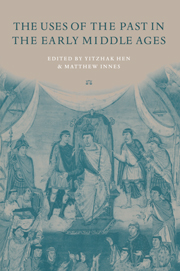Book contents
- Frontmatter
- Contents
- List of contributors
- Acknowledgements
- List of abbreviations
- Introduction: using the past, interpreting the present, influencing the future
- 1 Memory, identity and power in Lombard Italy
- 2 Memory and narrative in the cult of early Anglo-Saxon saints
- 3 The uses of the Old Testament in early medieval canon law: the Collectio Vetus Gallica and the Collectio Hibernensis
- 4 The transmission of tradition: Gregorian influence and innovation in eighth-century Italian monasticism
- 5 The world and its past as Christian allegory in the early Middle Ages
- 6 The Franks as the New Israel? Education for an identity from Pippin to Charlemagne
- 7 Political ideology in Carolingian historiography
- 8 The Annals of Metz and the Merovingian past
- 9 The empire as ecclesia: Hrabanus Maurus and biblical historia for rulers
- 10 Teutons or Trojans? The Carolingians and the Germanic Past
- 11 A man for all seasons: Pacificus of Verona and the creation of a local Carolingian past
- APPENDIX: The Memorial to Pacificus of Verona
- Index
9 - The empire as ecclesia: Hrabanus Maurus and biblical historia for rulers
Published online by Cambridge University Press: 14 August 2009
- Frontmatter
- Contents
- List of contributors
- Acknowledgements
- List of abbreviations
- Introduction: using the past, interpreting the present, influencing the future
- 1 Memory, identity and power in Lombard Italy
- 2 Memory and narrative in the cult of early Anglo-Saxon saints
- 3 The uses of the Old Testament in early medieval canon law: the Collectio Vetus Gallica and the Collectio Hibernensis
- 4 The transmission of tradition: Gregorian influence and innovation in eighth-century Italian monasticism
- 5 The world and its past as Christian allegory in the early Middle Ages
- 6 The Franks as the New Israel? Education for an identity from Pippin to Charlemagne
- 7 Political ideology in Carolingian historiography
- 8 The Annals of Metz and the Merovingian past
- 9 The empire as ecclesia: Hrabanus Maurus and biblical historia for rulers
- 10 Teutons or Trojans? The Carolingians and the Germanic Past
- 11 A man for all seasons: Pacificus of Verona and the creation of a local Carolingian past
- APPENDIX: The Memorial to Pacificus of Verona
- Index
Summary
Shortly before his death in 855, the Emperor Lothar I, Charlemagne's grandson, wrote to Hrabanus Maurus, monk, reknowned theologian and at this date archbishop of Mainz. He commissioned a liturgical compendium for use on his travels, containing the readings for mass all year round, each accompanied by its own explanatory homily (expositio et omiliaticus sermo). The homilies were to be read aloud to the emperor during meals, to sustain his homo interior with the infinite riches of spiritual food while he sat down at the imperial table. Apparently earlier efforts to gather suitable homilies for the annual liturgical cycle had failed in the face of an overwhelming and impenetrable amount of patristic commentary. Lothar's requirements were specific. Not only did the emperor need homilies for ordinary Sundays and feast days, but also for a host of special masses: on fast days or rogations, against invading armies, famine and poverty, against winter floods, barren earth and failing harvest; for a multitude of saints' days, for Ember Days, for the commemoration of the dead and for ceremonies of consecration – and there would be other masses of which Hrabanus could easily think if he put his mind to it. Furthermore, Jacob's blessings for his sons should be added, along with the benedictions Moses pronounced over the people of Israel on the eve of his death, as well as sermons for All Souls and the Invention of the Holy Cross.
- Type
- Chapter
- Information
- The Uses of the Past in the Early Middle Ages , pp. 191 - 226Publisher: Cambridge University PressPrint publication year: 2000
- 14
- Cited by



